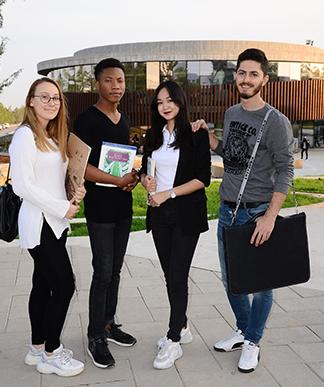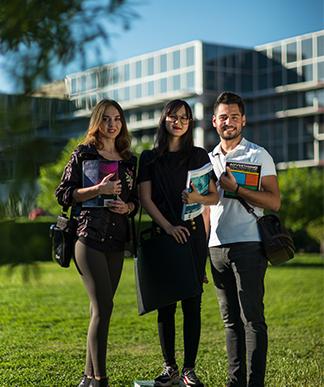Communication and Media Studies (PhD)



About the Program
The Communication and Media Studies Doctoral Program at CIU has been designed to enable students to make in depth explorations of the major social, cultural and political issues which arise from mass communication. After completing a range of specialist preparatory courses, students will produce a thesis that is intended to make substantial and original contribution to their field of study. The main objective of the program is to educate students capable of producing original ideas and communicating these ideas effectively to students and their academic peers. Graduates of the program will be able to analyse and discuss contemporary developments and theories within various fields related to mass communication, including film and television, journalism, public relations, advertising, and social media.
Education Opportunities
Courses in this Doctoral program include Political Communication and Propaganda, Critical Theory, Internet Cultures, Documentary Film and Television Social Gender and Media, Strategic Communication, and Integrated Communication. These courses have been selected to allow students to develop specialist knowledge on the aspect of communication closest to their research interests. Students must successfully complete seven courses and a research seminar in order to proceed to the qualifying examination stage. The qualifying examinations consist of two stages: written and oral. Juries are established for these examinations comprising of internal and external professors. Upon passing the qualifying examination, students start working on their theses under the guidance of their supervisor.

Career Areas
The Communication and Media Studies Doctoral Program is designed to raise Ph.D. graduates who wish to reach the highest level in their field, having produced an original thesis related to the area of communication and media. The program also aims to instill knowledge and skills to the high standard necessary for the field of professional communication.
Graduates of the program have the opportunity to pursue careers in the following fields:
- Academics in public or private educational institutions;
- Supervisors in the professional communication sector, editor, editor-in-chief, media planning specialist, correspondent/agent coordinator, senior media analyst, sales supervisor, advertising/commercial director, advertising/commercial agent, budget analyst, a representative for field sales, and video editor;
- High-ranking manager in public relations and advertising agencies;
- Manager in film and video production companies.
Contact
Institute of Graduate Studies and Research
Graduate Sciences and Education Center, GE106
Tel: +90 392 671 1111 Extension: 2776
Institute E-mail: ciu-institute@ciu.edu.tr
Compulsory Courses
First Semester
SEMINER
Course code
COMM690Credit
0Theoretical
0Practical
3Ects
4ELECTIVE
Course code
COMM6X1Credit
3Theoretical
3Practical
0Ects
8ELECTIVE
Course code
COMM6X2Credit
3Theoretical
3Practical
0Ects
8ELECTIVE
Course code
COMM6X3Credit
3Theoretical
3Practical
0Ects
8ELECTIVE
Course code
COMM6X4Credit
3Theoretical
3Practical
0Ects
8ELECTIVE
Course code
COMM6X5Credit
3Theoretical
3Practical
0Ects
8ELECTIVE
Course code
COMM6X6Credit
3Theoretical
3Practical
0Ects
8Second Semester
THESIS
Course code
COMM600Credit
0Theoretical
0Practical
0Ects
160PH.D QUALIFYING EXAMINATION
Course code
COMM650Credit
0Theoretical
0Practical
0Ects
20Philosophy of Science
Course code
PHIL601Credit
3Theoretical
3Practical
0Ects
8Elective Courses
POLITICAL COMMUNICATION AND PROPAGANDA
Course code
COMM614Credit
3Theoretical
3Practical
0Ects
10STRATEGIC COMMUNICATION
Course code
COMM615Credit
3Theoretical
3Practical
0Ects
10THE POLITICS OF MEDIA REPRESENTATION
Course code
COMM623Credit
3Theoretical
3Practical
0Ects
10INTEGRATED COMMUNICATIONS
Course code
COMM617Credit
3Theoretical
3Practical
0Ects
10CRITICAL THEORY
Course code
COMM610Credit
3Theoretical
3Practical
0Ects
10DOCUMENTARY FILM AND TELEVISION
Course code
COMM622Credit
3Theoretical
3Practical
0Ects
10SOCIAL GENDER AND MEDIA
Course code
COMM606Credit
3Theoretical
3Practical
0Ects
0INTERNET CULTURES
Course code
COMM624Credit
3Theoretical
3Practical
0Ects
10MEDIA HISTORY:TEXTS AND CONTEXTS
Course code
COMM532Credit
3Theoretical
3Practical
0Ects
10MESSAGE DESIGN AND MEDIA MANAGEMENT
Course code
COMM503Credit
3Theoretical
3Practical
0Ects
10NEW COMMUNICATION TECHNOLOGIES
Course code
COMM510Credit
3Theoretical
3Practical
0Ects
10RESEARCH METHODS IN COMMUNICATION
Course code
COMM501Credit
3Theoretical
3Practical
0Ects
10COMMUNICATION RESEARCH METHODS
Course code
COMM611Credit
3Theoretical
3Practical
0Ects
8ORGANIZATIONAL COMMUNICATION
Course code
COMM508Credit
3Theoretical
3Practical
0Ects
10RHETORIC
Course code
COMM612Credit
3Theoretical
3Practical
0Ects
Philosophy of Science
Course code
PHIL601Credit
3Theoretical
3Practical
0Ects
8DIFFUSION OF INNOVATIONS AND COMMUNICATION
Course code
COMM628Credit
3Theoretical
3Practical
0Ects
8SCIENCE FICTION FILM AND LITERATURE
Course code
COMM531Credit
3Theoretical
3Practical
0Ects
10THEORIES OF COMMUNICATION
Course code
COMM505Credit
3Theoretical
3Practical
0Ects
10GLOBAL MEDIA AND CONFLICT
Course code
INRE626Credit
3Theoretical
3Practical
0Ects
FILM AESTHETICS
Course code
COMM513Credit
3Theoretical
3Practical
0Ects
10STRATEGY AND MANAGEMENT IN MARKETING SCIENCE
Course code
BUSN604Credit
3Theoretical
3Practical
0Ects
8USES OF MEDIA IN POLITICAL COMMUNICATION
Course code
COMM504Credit
3Theoretical
3Practical
0Ects
10COMMUNICATION SYSTEMS
Course code
COMM507Credit
3Theoretical
3Practical
0Ects
10IMAGE MANAGEMENT
Course code
COMM618Credit
3Theoretical
3Practical
0Ects
SEMIOTICS OF IMAGE
Course code
GRDE503Credit
3Theoretical
3Practical
0Ects
8TOTAL QUALITY MANAGEMENT
Course code
EMNT502Credit
3Theoretical
3Practical
0Ects
0FOREIGN POLICY ANALYSIS
Course code
INRE602Credit
3Theoretical
3Practical
0Ects
ETHNIC CONFLICT
Course code
INRE624Credit
3Theoretical
3Practical
0Ects
INFORMATION SYSTEMS DESIGN AND MANAGEMENT
Course code
MISY606Credit
3Theoretical
3Practical
0Ects
QUALITATIVE RESEARCH METHODS
Course code
COMM515Credit
3Theoretical
3Practical
0Ects
ARCHITECTURE AND THE CITY IN SCIENCE FICTION MOVIES
Course code
ARCH619Credit
3Theoretical
3Practical
0Ects
0CASES IN ENTREPRENEURSHIP
Course code
BUSN624Credit
3Theoretical
3Practical
0Ects
8NEW COMMUNICATION TECHNOLOGIES
Course code
COMM510Credit
0Theoretical
0Practical
0Ects
10THEORIES OF COMMUNICATION
Course code
COMM505Credit
0Theoretical
0Practical
0Ects
10Students who are interested in pursuing advanced graduate studies leading to a master’s, doctoral degree or professional doctorate degree for the Fall and Spring semesters every year. Applicants can directly apply online to our graduate programs using the application portal.
TRNC Applicants- Required documents:
- Bachelor’s and Master’s Degree Diploma
- Bachelor’s and Master’s Degree transcripts for each completed academic term/year.
- Documents to prove English proficiency for English language departments,
- Scanned copy of passport or identity card.
Click for detailed admission requirements information.
Students who are interested in pursuing advanced graduate studies leading to a master’s, doctoral degree or professional doctorate degree for the Fall and Spring semesters every year. Applicants can directly apply online to our graduate programs using the application portal.
International Applicants- Required documents:
- A valid Bachelor’s Degree and transcripts for each completed academic term/year.
- A valid Master’s Degree and transcripts for each completed academic term/year.
- Evidence of English Language competence: TOEFL (65 IBT) or IELTS (5.5). Students without these documents will take the CIU English proficiency exam on campus following arrival.
- Scanned copy of international passport/birth certificate
- CV
- PhD research proposal
- Fully completed and signed CIU Rules and Regulations document (which can be downloaded during the online application)
Click for detailed admission requirements information.
Cyprus International University provides academic scholarships for its students as an incentive for success, with most students benefiting from 50%, 75% or 100% scholarships or discounted tuition fees. Click for more information.
Tuition Fees are determined at the beginning of each academic year. Candidate students who are entitled to enroll in CIU can learn their fees in line with the Tuition Fee Calculation system.